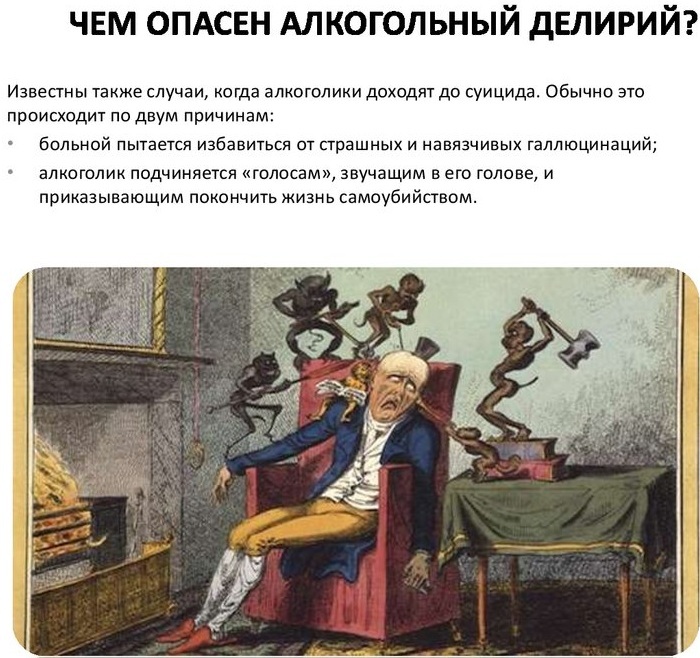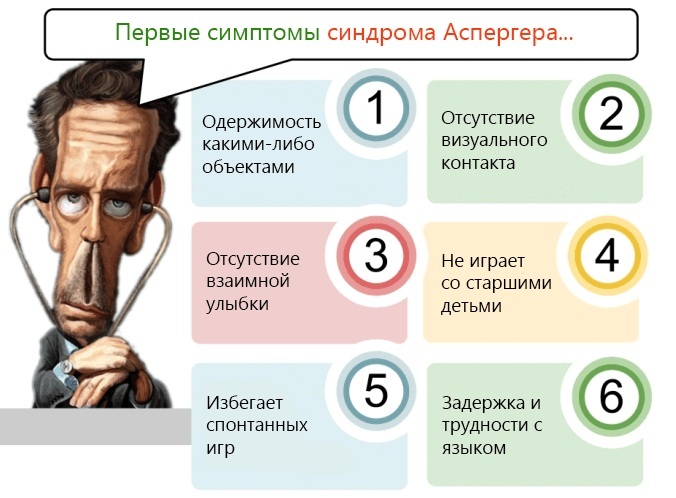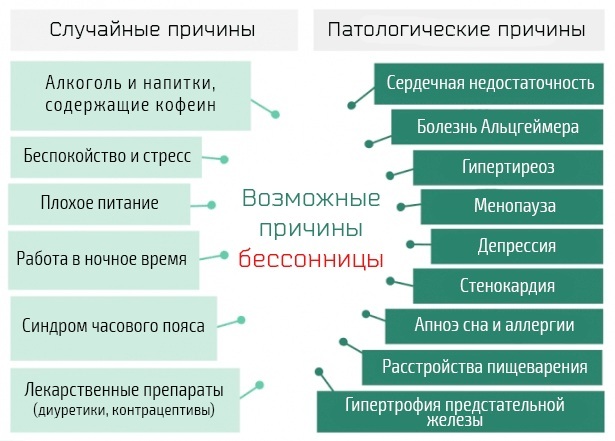Sometimes, when dealing with older people, you will notice they have a weakening of attention and memory, shake hands and head, and even strange behavior. These symptoms may indicate a serious disease - dementia.
The content of the article:
- 1 What is Dementia
- 2 Causes of dementia
- 3 To which the doctor ask
- 4 Methods of diagnosis of dementia
-
5 Methods of treatment of dementia
- 5.1 medication
- 5.2 folk ways
- 5.3 Psychotherapy
- 5.4 sociotherapy
- 6 dementia Prevention
- 7 What is needed for nursing
- 8 possible complications
- 9 Videos about dementia
What is Dementia
Dementia (Latin for "dementia") - a disease of the central nervous system, in which age is destroyed, degeneneratsiya its structures. Manifested a gradual loss of thinking functions - memory, logical thinking, the ability to analyze, speech, movement disorders.
Suffering and emotional sphere. The disease is chronic slowly progressive nature of the flow.
Symptoms usually occur after 60 years, with two-thirds of patients with dementia - a woman.
Senile dementia is the most common cause of disability of older people, their violation of social activities and relationships with loved ones. Dementia can be presenile - starts earlier, with about 50 years of age and senile (senile), which manifests itself after 60 years. The first has a more rapid progression and various symptoms.

By level of dementia, brain lesions can be:
- cortical - affected the cerebral cortex, and as a result suffers from the higher nervous activity;
- subcortical - when the brain cell death in various structures of symptoms will vary;
- mixed variant - suffering and bark, and subcortical structures of the brain;
- multifocal - the death of affected neurons located both in the central and peripheral nervous system.
Causes of dementia
Dementia in older people, whose symptoms appear after 60 years, has several causes. Depending on this, there is the following species:
1. Atrophic, it is the primary dementia (Alzheimer's disease)It is about 60-70% of all cases.
The causes and triggers of this disease have not been established. Proved dominant pattern of inheritance of susceptibility to it.
In this form of dementia is accelerated natural aging of nerve cells of cerebral cortex, and atrophy of their degeneration. The cells themselves accumulate specific proteins that disrupt metabolic processes within the cell and between adjacent cells.
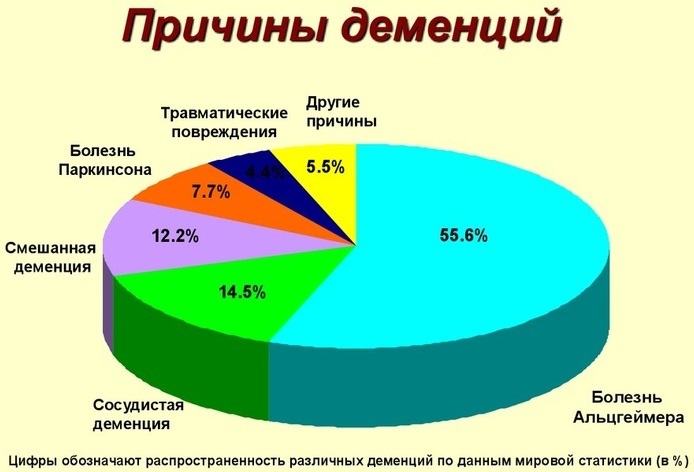
Information transfer is difficult or not at all. As a result of these mechanisms is a mass death of nerve cells. Clinically, it can be seen from the patient's progression of dementia and the appearance of new symptoms thereof. After the diagnosis of Alzheimer's disease life expectancy is an average of 7 years.
2. Vascular, secondary. It is a consequence of cerebral blood flow, his failure.
Known fact that when the brain weight of 2% of total body weight, it consumes 25% glucose, and it accounts for 25% of the blood flow. Therefore, diseases that lead to poor circulation in the body, are potentially dangerous factors for vascular dementia.
It pathologies such as diabetes, hypertension (especially its complications such as a stroke), atherosclerosis. Reduced blood flow inevitably leads to oxygen starvation of cells in the brain (hypoxia) and mass death.
Following this lost function and those areas of the brain, where pockets of dead cells are detected. Therefore, when this type of dementia other than destruction of the cerebral cortex, observed motor disorder - paresis, paralysis, abnormal gait, facial asymmetry, poor coordination, tremor and head.
3. Mixed. In the diagnosis of both diseases revealed mechanism.
This type is in second place after the disease frequency of Alzheimer's in elderly patients. Dementia can also be a complication of some diseases such as traumatic brain injury, tumor processes, alcoholism, infections (AIDS, syphilis, tuberculosis, viral brain damage).
To which the doctor ask
The earlier the diagnosis and treatment of disease, the more likely the patient to return to normal life, taking into account the specificity of dementia.
Dementia in older people, the symptoms of which at its initial stage - decreased ability to remember new information, sleep disturbances, headaches, increased or decreased (relative to the normal state) emotionality.
With progression gives such displays as suspiciousness, forgetfulness, confusion, deterioration of the orientation in space and time, carelessness, tearfulness.
Vascular dementia begin movement disorders - there is shuffling gait instability, dizziness, trembling of the hands, feet, head (especially in lesions of the pyramidal system of the brain - disease Parkinson).
In this case, the patient need assistance of relatives or close friends, as criticism to his condition is observed in a minority of patients with dementia.
They may have several options: contact a specialist generalist - a therapist who, after examination and identification of symptoms to send a doctor to the profile.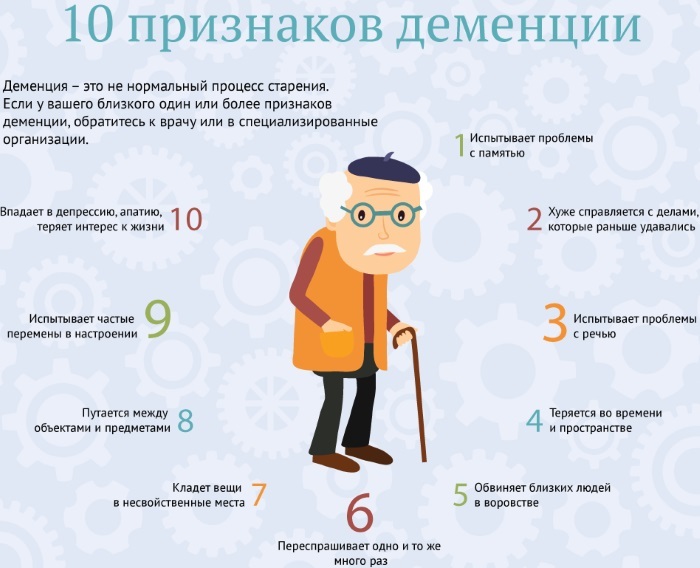
Or you can go to a specialist - a neurologist, neurologists, psychiatrists, gerontologists (on diseases of the elderly specialist). It should start from the existing complaints and symptoms.
Neurology and neuropathology in the survey focus on neurological symptoms - changes reflexes, motor function, speech and coordination. The survey must necessarily include the study of brain structure (radiography, computed tomography, magnetic resonance method) and functional characteristics (rheoencephalography, electroencephalography).
The psychiatrist will be able to evaluate the degree of impairment of the functions of memory, thinking, attention, emotional sphere. Basically, in his work he uses survey methodology, questionnaires and various test options.
Methods of diagnosis of dementia
At the initial stage of questioning it is important to find out how recently the patient became more difficult to cope with their normal activities and responsibilities. And find out what other diseases are available (particularly those that cause circulatory disorders).
Dementia in older adults can cause symptoms such as a decrease of some reflexes, instability of posture, incoordination of movement, speech, oculomotor functions, asymmetry person. All this may reveal a neurologist at the patient's examination.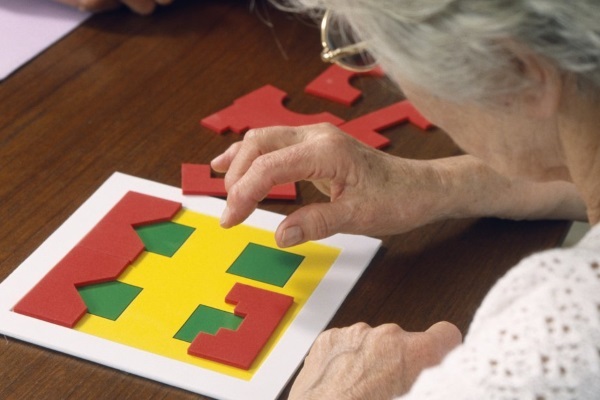
Then carried out tests to check mental functions - associative thinking, memory, attention. A very common test when the patient is asked to draw a clock dial with the numbers or name the months of the year. Dementia such simple tasks are already causing difficulties.
To see brain atrophy in Alzheimer's disease, it is necessary to carry out X-rays or computed tomography of the brain. Magnetic resonance imaging can help identify areas of reduced activity in the brain.
To check the electrical activity of the brain is used electroencephalography, and for the study of blood flow in different areas - rheoencephalography.
Methods of treatment of dementia
Traditional medicine for the treatment of patients with dementia recommends medication, psychotherapy, Sociotherapy, as well as proper care of them. In addition, there are traditional recipes.
medication
Alzheimer's disease, unfortunately, is incurable.
Her treatment is aimed at slowing down the process of degeneration of brain cells and anti-symptomatic manifestations of the disease.
Recommended inducing drugs decrease deposition of proteins forming the plaque in the brain and enhance the activity of nerve cells. They also have properties to improve memory and thinking functions. This Rivostigmin (manufactured as a patch for continuous wear).
Preparations for the treatment of symptoms of dementia:
-
nootropics - Piracetam (1200 mg, receiving 2 tablets 3 times a day treatment for at least 1 month), Glycine (1 tablet 3 times a day, 2-4 weeks a course of treatment) Meksidol (1 tablet 3 times a day treatment 2-6 weeks). Improve metabolism in the brain, normalize blood flow. As a result - correct thought processes and improve memory.

- When behavioral disorders, motor and emotional disinhibition on the background of delusions and hallucinations are appointed antipsychotics - Eglonil (200-400 mg per day, for a long time), Sonapaks (30-100 mg per day, for a long time), haloperidol (2-3 mg per day, taken with meals, the course can be very long). These drugs are given only under the supervision of professionals, since they have a lot of side effects.
- antidepressants - amitriptyline (an appointment with 1-2 tablets of 25 mg at night, the course of treatment up to a year), Geptral (800 mg night, a course to a few months) and Anafranil (25 mg 2-3 times a day), Paxil (20 mg taken in the morning). Apply with a strong apathy, lethargy, inactivity, depressive mood.
- hypnotics - prescribed for agitation, severe insomnia or other sleep disorders. Zolpidem (10 mg tablet is taken one piece. after food at night, the treatment 1 month), Zopiclone (7.5 mg tablet before bedtime, the treatment 1 month), Nitrazepam (5 mg tablet, the reception 30 minutes. before bedtime, treatment for 1 month).
In vascular dementia based therapies constitute the drugs that improve cerebral blood flow. These are the same nootropics: Nootropil, Glycine, Cere Meksidol. Also in need of treatment of the disease that caused the breach.
More often in therapy include agents that decrease blood viscosity (Aspirin Cardio), cholesterol-lowering agents (statins), antihypertensive drugs. They used long courses.
folk ways
In folk medicine, the treatment is also aimed at the general state of the correction and reduction of dementia symptoms.
| Means | How to prepare and apply | How does |
| Peppermint and ginger | Mint leaves and grated ginger root to pour liter of boiled water and let stand. After cooling the drink is ready, it can be used by adding honey. Restrictions on the number of the day there. | Drink strengthens blood vessels, normalizes blood pressure and blood flow. |
| bilberry | You can take it in the usual form, frozen, in the form of tea or juice. At day to about 250 mL of juice. | It improves the microcirculation in the small blood vessels and capillaries, making them stronger wall. |
| The root of elecampane | 1 teaspoon root pour cup lukewarm water and infuse. | Take 3 times a day before meals. |
| Sage | 1 tablespoon of leaves pour 2 cups boiling water and leave to cool. Take as a tea three times a day. | It improves memory and attention. |
| The bark of mountain ash | 50 g of bark boiled water and boiled 5-10 minutes on low heat. Take need 3 tablespoons of broth, 4-5 times a day | Strengthens blood vessels. |
| Ginseng and Siberian ginseng | They are more convenient to buy ready-made and take a few drops a day. | Improve memory. |
| Melissa | You can take it a decoction 3 times a day, or added to tea. For the preparation of sugar and 1 tablespoon of leaves in two cups of boiling water and infuse. | Activates the nerve cells. |
| Ginkgo biloba | Ready tea with this plant should be taken every day on an empty stomach. | It improves the properties of blood and normalizes the blood flow in the blood vessels and capillaries. |
Psychotherapy
Dementia in the elderly, which are just beginning to show symptoms well be corrected using psychotherapeutic techniques. Sport increases the tension and the work of nerve cells and promote the formation of new relationships between them.
With timely and properly conducted therapy can significantly delay the onset of total dementia, in which the patient loses self-service skills and is lost in his own personality. Active intellectual activity also slows the progression of the disease.
Apply the following techniques:
- Keeping a diary. Record daily past events and planning regulations consecutive days helps patients remember and mentally organize their affairs. Maintain written skills are also useful for the prevention of atrophy of the areas responsible for the letter.
- group trainingActivating cognitive functions.
- Patients in group talk about the books they have read, memorize verses, solve puzzles and perform a variety of intellectual tasks (for example, to find an extra picture of several logical or continue chain).
- Biographical studies. Aimed at preserving the patient's personality. It is invited to talk about themselves through the records, photographs and a memory.
- Art Therapy - Drawing helps keep writing skills, abstract thinking and fine coordination. Often invited to draw a clock face with numbers showing the right time, staircases, spiral, write the words in reverse order.
- Modeling clay, plasticine, dough - it helps maintain the tactile sensitivity, spatial thinking and coordination.
- auditory exercises - singing songs, rhymes, poems or telling the content viewed films. It helps to activate the auditory region of the brain, train attention and memory.
- It is recommended to choose a new, previously unknown area of study - for example, learn a new language, or a history section, to learn photography skills and more. The patient appears goal and interest, and how he plans to be able to reach it. Learning a language is particularly effective, because it requires reading, listening, writing and memorization.

- Therapy - pet. Communication with various animals - cats, dogs, horses a very beneficial effect on the emotional sphere, reduces depression and apathy.
sociotherapy
To maintain communication skills, attention to patients with dementia need to interact with other people. Lack of communication, only to find the house has a negative impact on the state and development of the disease.
In its initial stage, patients need to communicate and to find relatives of people in society. This can be walking, going to the theater, exhibitions, various clubs and courses. Impact on the emotional and thinking functions can be very noticeable. Useful exercise may be non-severe work in the garden, in the garden or just a walk in nature.
In the later stages of the patients, mainly requires communication with loved ones in the family. At this stage, the main task - to maintain self-help skills, stored in the memory core personality traits and data.
dementia Prevention
Alzheimer's disease, the exact cause and trigger of which is not known, yet can not be prevented.
But vascular dementia is a clear causal relationship with atherosclerosis, diabetes, hypertension, infections, and injuries. And it is quite possible to avoid or postpone to a later age.
Preventive measures:
-
Rejection of bad habitsCausing spasm and vascular damage - alcohol, smoking, stress, improper rhythm of sleep and wakefulness.

- proper nutrition, Which includes a lot of vegetables and fruits, nuts, fish, particularly fatty, greens, dairy products. At the same time should avoid fatty, fried, sweet, spicy dishes. Do not overeat.
- Sports, physical activity. Contribute to the normal functioning of the heart and blood vessels, active breathing (including brain cells), maintaining a normal body weight.
- Intellectual activity. Frequent reading, solving puzzles and problems, learning and memorizing new information help to restore the work of nerve cells and the formation of new chains between them.
- Control over their health. It is necessary to control the level of blood pressure, pulse rate and accuracy, cholesterol and blood glucose.
What is needed for nursing
Specialists have noticed that after placing dementia patients for compulsory treatment in a hospital, whose condition begins to deteriorate steadily. This suggests that the home environment, communication with loved ones and familiar things very beneficial effects on mood, well-being and sleep patients.
Dementia in older people, the symptoms of which are just beginning to emerge, could well stay at this stage for a long time. This requires monitoring of patient care and the right attitude home.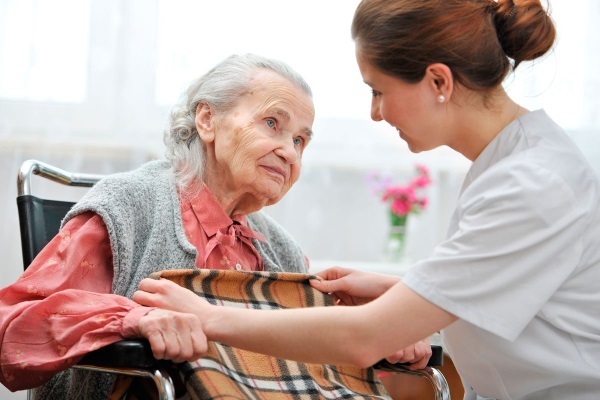
- Native is important to understand that next to them is a sick man. Who does not forget, or asks something drops out of spite. It's just the symptoms of his illness.
- It is necessary to maintain social ties, hobbies or interests of the patient. They give him food for thought.
- With people with dementia, you need a lot of talk, talk, keeping the visual and tactile contact (take the hand).
- Be patient, do not rush and do not be offended.
- If the patient that it is impossible - to help him, but it is not necessary to take care of all his affairs.
- Maintain sufficient proper nutrition.
- Control night's sleep. He must get over the day.
- In the later stages of dementia is necessary to help the patient to maintain the skills of self-service and self-care. Remove from accessing dangerous objects - toxic substances, sharp and easily flammable materials.
possible complications
The more progressive dementia, the stems likelihood of its complications.
It can be:
-
sleep disturbances - insomnia at night and a long nap. Adjusted correct mode of the day and sleeping.

- Impaired emotional sphere - anger, suspicion, or on the contrary frequent tears and sentimentality. Treated with tranquilizers.
- behavior problems - possible aggressive manifestations, assault, attacks on relatives. There are oddities and eccentricities. Status docked neuroleptics.
- Depression, apathy, suicidal thoughts. In this case, the appointed antidepressants.
- Delusions and hallucinations. Most often poisoning delusion, steal loved ones. Docked neuroleptics.
- Sexual deviations. The patient may lose a sense of shame, publicly naked or chase someone.
- In the last stage may be incontinence.
Despite the fact that dementia in old age can not be cured completely, its symptoms and the course can be controlled.
A very important role, in addition to proper treatment prescribed by a doctor, played by patient care and the rhythm of life.
Author: Natalia Kalegova
Registration of the article: Mila Friedan
Videos about dementia
What is dementia in the elderly:

